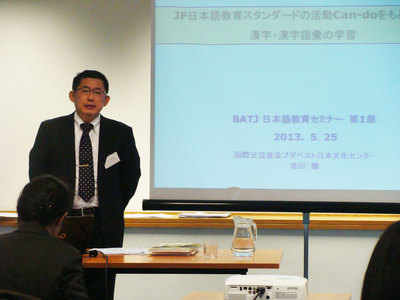11/06/2013
 |
On May 25th 2013, approximately 40 people attended a seminar on Kanji and Kanji Vocabulary Learning based on JF Standard’s Can-do Statements, jointly run by the Japan Foundation London and the Association for Teaching Japanese as a Foreign Language (BATJ). This seminar was run by Toru Sakaida, Senior Japanese Language Advisor at the Japan Foundation Budapest, at the Japan Foundation London. Part 1 of the seminar was entitled Kanji / Kanji Vocabulary Learning Based on Can-do Statements for Communicative Language Activities in JF Standard for Japanese-Language Education (JF Standard). In this seminar, participants deepened their understanding of the relationship between JF Standard’s Can-do statements and kanji teaching, by exploring the kanji and vocabulary needed by Japanese language students when confronting reading and writing tasks. As languages that use kanji have not been considered in the Can-do statements in the Common European Framework of Reference for Languages (CEFR), this proved to be a good opportunity to consider the relationship between reading and writing activities and script. Part 2, entitled Excel 3 Steps for Kanji vocabulary – Training method for the accurate understanding of Kanji vocabulary with typing by using Excel, introduced study methods for kanji vocabulary using the rubi function in Microsoft Excel. This “Excel 3 Step” aims to get learners familiar with kanji forms and readings by using a computer to type Japanese. In today’s modern world in which typing with a PC has become the norm, “writing” kanji involves recognising the possible kanji that appear when converting from romaji to characters, and selecting the correct one. The “Excel 3 Step” method is a modern practice technique that increases learners’ kanji vocabulary by repeating this process. Some of the feedback given from participants of the seminar included: 「今回のセミナーでJF Can-doの使い方が以前より理解できた気がします。とても濃い内容でとても勉強になりました。」 (“Thanks to this seminar I think I have a better understanding of how to use Japan Foundation’s Can-do statements than before. The content was very informative and useful.”) 「漢字学習を作文のタイプ打ち以外どのように練習できるか、長い間課題になっていました。良い例を頂きました。」 (“How to practice kanji other than typing compositions has long been a subject of discussion. This seminar gave some good examples.”) 「実践的なセミナーでとても役に立ちました。さっそくエクセルシートで漢字ワークシートを作りたいと思います。」 (“This practical seminar was really useful. I now want to make a kanji worksheet using Excel straight away.”) |



 Japanese Language Navigation
Japanese Language Navigation
